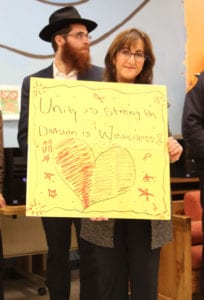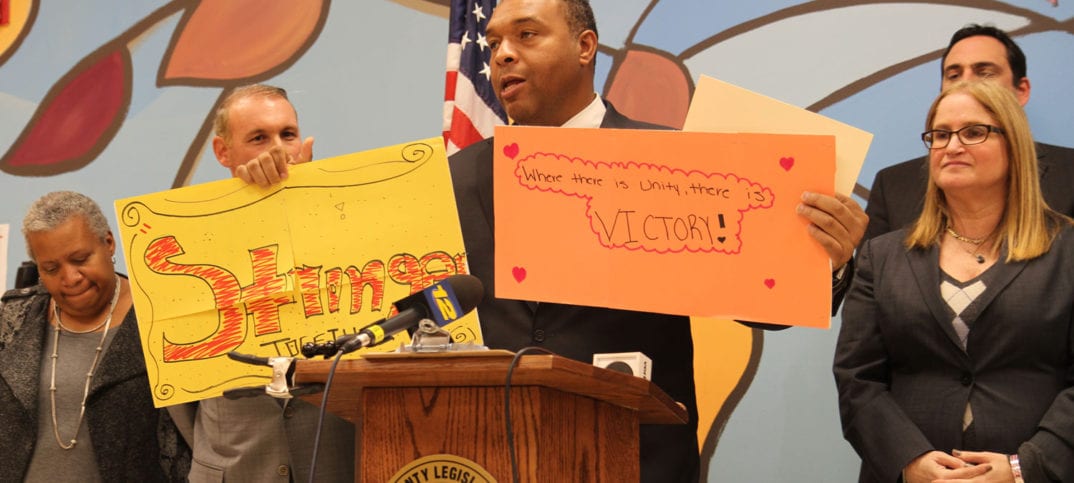By Victoria Espinoza
The divisive nature of the 2016 presidential election is still affecting many Americans, and racist, anti-Semitic and other xenophobic actions have occurred in some communities.
Local legislators, police officers, school administrators and religious leaders gathered at the Tri Community Youth Association in Huntington Nov. 23 to preach inclusivity and acceptance after several hate-driven incidents were reported.
Two weeks ago, police said multiple swastikas were found spray painted on walls at Northport High School, and town officials said residents have reported hearing hateful language as well.
Suffolk County Legislator Rob Trotta (R-Fort Salonga) said parents and community members need to teach children the importance of accepting one another.
“One of these incidents is one too many,” he said during the Huntington event. “It’s our responsibility to speak out against it and educate our youth of the ramifications of such actions.”

Suffolk County Legislator William “Doc” Spencer (D-Centerport) echoed the sentiment.
“I want to take this opportunity to come together, to speak to our anxieties, our fears, our concerns that have been spurred by acts of predominantly ignorance,” Spencer said at the event. “We now have a new generation of young people that may not have experienced the Holocaust or the civil rights movement, and this call of unity is not speaking against acts for any particular group, but for all of us. Whether it’s with minorities, in the Jewish, Muslim, Christian community; this is condemning acts of hatred for all of us.”
Spencer said he has received multiple calls from friends and colleagues detailing stories of bullying and threatening acts in recent weeks.
“We are better than this. We can disagree with dignity and without being threatened or going as far as to commit a crime,” Spencer said.
The legislator outlined the many resources available to the public to battle hate crimes and encourage the observation of human rights, including education programs for students, and officers who are specifically trained to recognize hate crimes and counsel victims.
Rabbi Yaakov Saacks from the Chai Center in Dix Hills detailed programs offered to educators to help them teach about the Holocaust.
Saacks urged teachers to give extra attention to Holocaust studies and racism studies. The rabbi said he is involved with the Memorial Library, an organization that supports Holocaust education with satellite seminars, mini grants and more to help schools teach students about the Holocaust. He also offered to travel to schools himself to teach students.
“I believe a Holocaust symbol, while it’s true it’s hurtful to the Jews, the swastika … is hurtful to us all,” Saacks said. “Sixty million people died because of Hitler’s nonsense in World War II. Ten percent of those were of the Jewish faith. Fifty-four million non-Jewish people died. Over three percent of the world’s population were killed in WWII — 292,130 U.S. soldiers were killed in battle. The Iraq War was 5,000. The Civil War was 87,000. It’s not only a Jewish problem. The swastika hurt us all and hurts us all greatly.”
“We are better than this. We can disagree with dignity and without being threatened or going as far as to commit a crime.”
— William Spencer
Kenneth Bossert, superintendent of Elwood school district as well as the vice president of the Suffolk County School Superintendents Association, agreed educators need more help teaching students about these sensitive issues.
“Schools are a reflection of what’s happening in society,” Bossert said. “What children bring with them to the classroom is not only what they learn from their teachers, but what they’re learning in their homes.”
Bossert said he has been an educator for more than 20 years, and this is the first presidential election he remembers that required teachers to talk about issues of race and division.
“Typically, after a presidential election, the results come in and teachers instruct about lessons on the Electoral College and the popular vote and how states break it down,” he said. “The lessons were very different this year. The lessons were about community and respecting others and making everyone feel comfortable and welcome in the hallways and the classrooms.”
Bossert said he wanted to correct one word used throughout the rally: tolerance.
“That’s not a word I use,” he said. “The word I use is acceptance. Tolerance implies that we’re going to tolerate someone who is somehow less than we are. Acceptance implies respect, community and love for one another.”







